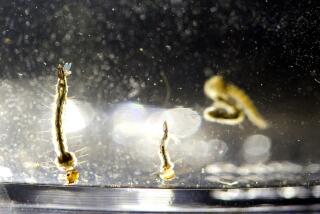Genetically Altered Frost Fighter : Firm Bows to Concerns on Bacteria Field Test
SALINAS, Calif. — Scientists from an Oakland-based genetic-engineering company offered Monday to postpone for 30 days their planned open-air test of a frost-fighting bacteria, the first deliberate release of a genetically altered organism into the environment.
The test, authorized by the U.S. Environmental Protection Agency in November, has caused a considerable stir in Monterey County, which was selected as the test site by the genetic-engineering company, Advanced Genetic Sciences Inc.
Acknowledging the local controversy, the Advanced Genetic scientists apologized to the Monterey County Board of Supervisors in a special meeting at the Salinas Community Center. They also offered to delay the test, which was scheduled for mid-February, while making public the results of the company’s laboratory studies on the safety of the altered microbe.
Further Study Offered
In addition, the scientists offered to conduct further studies if requested and even move the test site from the small farming town of Castroville to a more remote part of the county.
“I don’t blame you for being concerned about the lack of information (released publicly) to this point,” said Douglas Sarojak, a plant pathologist and marketing director for the small genetic-engineering firm. “We were not aware how strong your interest in this matter was. We hope today and in the weeks ahead to provide you with all the information needed to address your concerns.”
Board of Supervisors Chairman Sam Karas said the board will discuss the company’s offer of further information--as well as requests from a handful of local opponents for a county land-use ordinance banning such tests--at a regular board meeting “within the next few weeks.”
Opponents, including representatives of the Washington-based environmental lobbying group Foundation on Economic Trends, contend that the test should not be allowed because the new genetically altered bacteria, a form of Pseudomonas syringae, have not been adequately tested for their potentially negative effects on people and the environment.
‘Very, Very Improper’
Although several county supervisors were upset at not being involved sooner in planning the proposed experiment--”I would not say it is criminal,” grumbled Supervisor Dusan Petrovic, “but it is very, very improper”--the controversy focused primarily on the issues of how safe is safe and how many tests are enough to decide.
In addition to laboratory tests done by the company, the EPA, National Institutes of Health and the Food and Drug Administration all reviewed the test results and the proposed field experiment. A panel of independent academic experts also reviewed the proposed field test and, after some minor adjustments, approved it.
Risk Called Negligible
One of those independent experts, UC Berkeley zoologist Robert Colwell, said no experiment--certainly not one involving a new technology such as genetic engineering--is without risk. But the risk must be put in perspective, he said.
“There is never 100% certainty in science; we know that,” he said. “We can’t say with 100% certainty that something is completely without risk. We can, however, show if the risk is negligible, and we believe the risk with (this bacteria) is negligible.”
More to Read
Sign up for Essential California
The most important California stories and recommendations in your inbox every morning.
You may occasionally receive promotional content from the Los Angeles Times.










